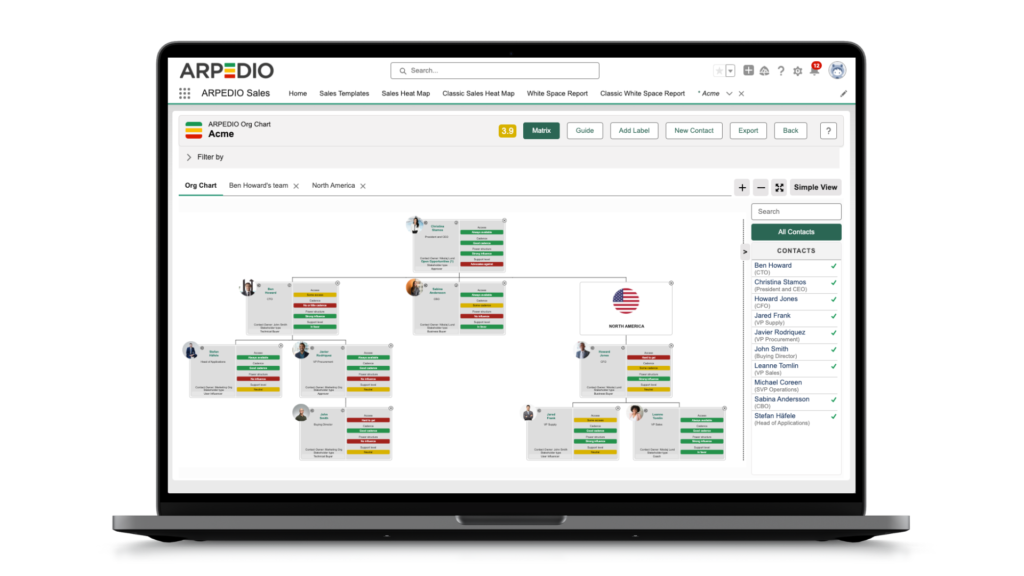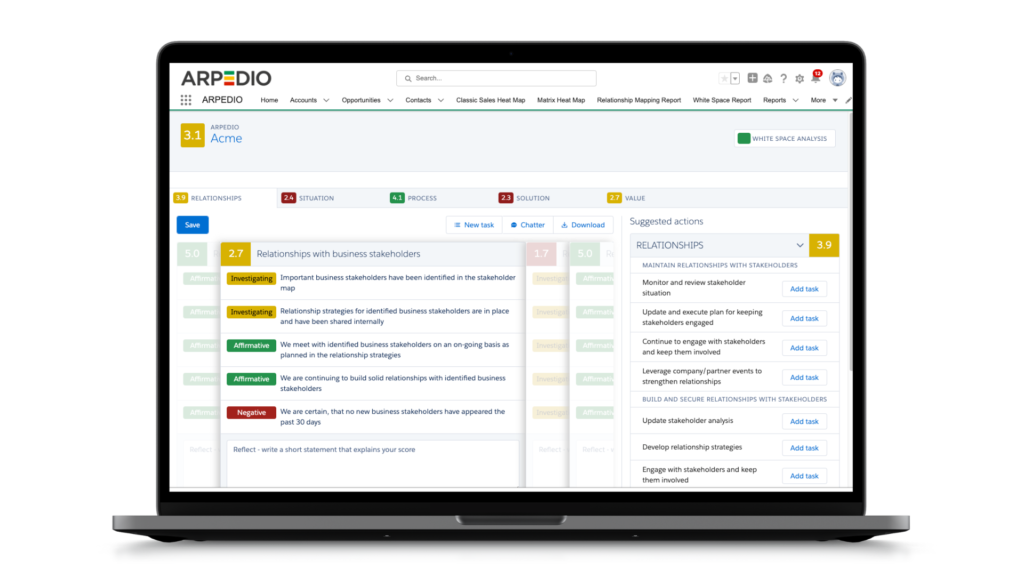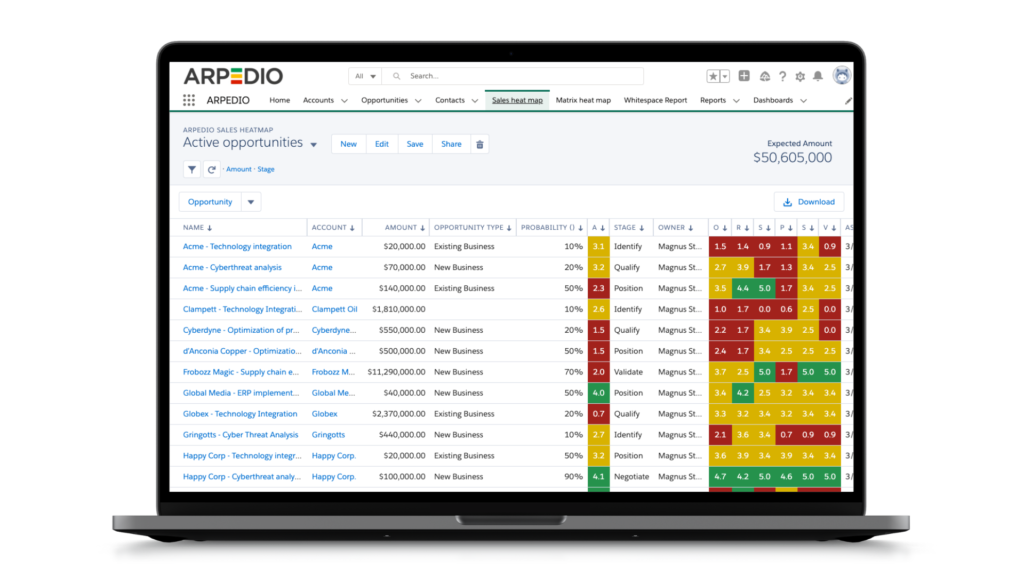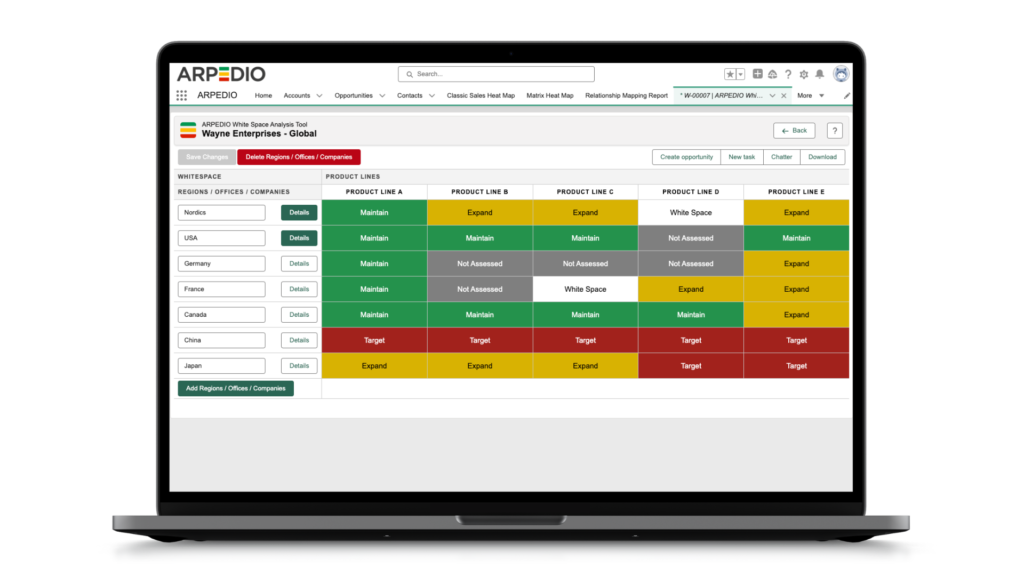In the realms of sales enablement and Customer Relationship Management (CRM), bridging this trust gap is paramount. AI has the potential to revolutionize how sales teams operate and interact with customers, but it must first overcome significant trust hurdles. This article examines key aspects of building trust in AI, highlighting how transparency, ethical frameworks, data governance, human-centric design, and continuous learning can transform AI into a reliable partner in sales and Strategic Account Management (SAM).
By addressing these areas, organizations can demonstrate their commitment to responsible AI usage, fostering confidence among salespeople and customers. This approach not only bridges the trust gap but also enhances the overall effectiveness of AI-driven solutions in driving business success.
Building Confidence in AI’s Potential
AI has emerged as an important force in revolutionizing SAM and sales enablement. These fields, which are critical to driving business growth and building lasting customer relationships, are continuously and increasingly leveraging AI to reach higher levels of efficiency, insight, and productivity. However, the full potential of AI in these areas can only be realized if businesses can bridge the trust gap that still surrounds the technology.
AI’s growing role in SAM and sales enablement
In SAM, AI offers sophisticated tools that enable businesses to analyze vast amounts of customer data, identify trends, and develop more effective strategies for managing key accounts. By providing actionable insights into customer behaviors and preferences, AI helps account managers tailor their approaches to meet the unique needs of each client, fostering stronger and more profitable relationships.
Sales enablement, on the other hand, benefits from AI by automating routine tasks, personalizing customer interactions, and enhancing the overall sales process. AI-driven solutions can analyze sales data to forecast trends, identify high-potential leads, and optimize sales strategies. This allows sales teams to focus more on building relationships and closing deals, rather than getting bogged down by administrative tasks.
The trust gap in AI
Despite these promising advancements, a significant trust gap exists. According to the Ipsos Consumer Tracker, only 43% of individuals trust AI tools to avoid discrimination or bias against any group. This level of trust, while slightly higher than that placed in humans (38%), indicates a widespread skepticism that businesses must address to fully capitalize on AI’s potential.
For AI to be truly effective in SAM and sales enablement, stakeholders must have confidence in its reliability, transparency, and ethical use. The trust gap refers to the difference between what AI can potentially achieve and the level of confidence users have in its application. Bridging this gap is not merely a technical challenge; it requires a multifaceted approach that encompasses ethical considerations, transparency, and user engagement.
Bridging the trust gap
To bridge the trust gap in AI, particularly in the context of SAM and sales enablement, organizations need to focus on several critical aspects:
- Transparency
- Ethical frameworks
- Data governance
- Human-centric design
- Continuous learning and adaptation
By addressing these aspects, organizations can demonstrate their commitment to responsible AI usage and build the trust necessary for successful AI adoption in SAM and sales enablement. This not only enhances operational efficiency but also strengthens customer relationships and drives business growth.
In the following, we will delve deeper into each of these trust challenges, offering practical insights and strategies to overcome them, ensuring that AI adoption in sales and account management is accompanied by trust and confidence.
1. Transparency
One of the primary concerns surrounding AI when it comes to SAM, is its inherent opacity. Often dubbed the ‘black box’ problem, AI systems’ decision-making processes remain inscrutable to users, leaving them unable to decipher how AI arrives at its conclusions and prompting questions about accountability, bias, and unintended consequences.
In the context of sales, this lack of transparency can lead to distrust among salespeople who rely on AI to guide their strategies and interactions with clients. When sales professionals cannot understand how AI recommendations are made, they may hesitate to fully embrace these tools, fearing that the decisions could be flawed or biased.
To bridge the trust gap and help sales professionals confidently leverage AI, developers must prioritize transparency. This involves providing clear insights into how AI algorithms operate, the data they utilize, and how conclusions are reached. Here are some key steps to achieve this:
- Explainable AI: Implement AI models that can provide explanations for their recommendations. For example, if an AI tool suggests a particular sales approach, it should be able to explain the rationale behind this suggestion, such as specific customer data points or historical trends that influenced the decision.
- Data provenance: Ensure that the data used by AI systems is well-documented and traceable. Salespeople should know the sources of the data, how it was collected, and how it has been processed. This helps in understanding the context and relevance of AI-driven insights.
- User education: Educate your sales people on how AI works and the principles behind its algorithms. Training sessions, workshops, and user-friendly documentation can demystify AI and empower sales professionals to use these tools effectively and responsibly.
- Feedback mechanisms: Incorporate feedback loops where sales people can question or challenge AI decisions. This not only helps in refining the AI models but also ensures that sales professionals feel their expertise and input are valued in the decision-making process.
- Transparency reports: Regularly publish reports that detail the performance, biases, and updates of AI systems. This practice can build trust by showing a commitment to accountability and continuous improvement.
By demystifying the black box, organizations can instill confidence in their AI solutions and alleviate concerns regarding unintended consequences. When salespeople understand how AI systems work and trust the recommendations they provide, they are more likely to integrate these tools into their workflows, enhancing their effectiveness and productivity.
Incorporating transparency into AI systems used in sales enablement and SAM not only bridges the trust gap but also empowers sales professionals to make more informed and confident decisions, ultimately leading to better customer relationships and improved sales outcomes.
2. Ethical frameworks
AI’s transformative power in sales brings with it significant ethical responsibilities. Decisions influenced by AI in these fields have direct impacts on customer relationships and business outcomes. From safeguarding privacy to preventing algorithmic discrimination, ethical considerations must underpin every stage of AI development and deployment to build trust and ensure responsible use.
In a world where AI influences critical sales decisions, how do we ensure that its use aligns with ethical principles and societal values? Establishing robust ethical frameworks is essential to ensuring that AI systems in sales and CRM are used responsibly and fairly. Here’s how organizations can achieve this:
- Fairness: Ensure that AI algorithms are designed to be fair and unbiased. This involves regularly auditing AI systems for biases and implementing corrective measures when necessary. For instance, sales AI tools should provide equitable opportunities and insights across different customer demographics, avoiding any form of discrimination.
- Accountability: Assign clear accountability for AI decisions. When an AI system makes a recommendation or decision that affects sales strategies or customer interactions, there should be a mechanism in place to trace and understand that decision. This accountability ensures that humans remain in control and responsible for AI’s actions.
- Transparency: As discussed, transparency is a cornerstone of ethical AI. Clear communication about how AI systems work, what data they use, and the logic behind their decisions is crucial. Transparency builds trust and allows salespeople to understand and confidently use AI tools.
- Privacy protection: Prioritize the protection of customer data. AI systems in sales and CRM often handle sensitive customer information, and it’s vital to ensure that this data is used ethically and stored securely. Compliance with data protection regulations, such as GDPR, and implementing best practices for data security are essential steps in maintaining customer trust.
- Ethical guidelines and training: Develop and implement ethical guidelines for AI usage in sales and CRM. This includes creating comprehensive policies that outline acceptable uses of AI and providing regular training for employees. Ensuring that sales teams understand the ethical implications of AI helps promote responsible use and decision-making.
- Customer consent and control: Give customers control over their data and how it is used by AI systems. Obtaining explicit consent for data collection and usage, and providing customers with options to manage their data, fosters a sense of trust and respect for their privacy.
- Continuous monitoring and improvement: Ethical AI is not a one-time implementation but an ongoing commitment. Regularly monitor AI systems for ethical compliance, and be prepared to adapt and improve them in response to new challenges and insights. This proactive approach ensures that AI systems remain aligned with ethical standards and societal values over time.
By embracing these ethical principles, organizations can cultivate trust and demonstrate their commitment to responsible AI usage. Implementing robust ethical frameworks ensures that AI systems in sales enablement and CRM align with societal values and adhere to legal regulations. This not only builds trust among salespeople and customers but also enhances the overall effectiveness and reliability of AI-driven solutions in driving business success.
3. Data Governance
It’s impossible to talk about AI without also mentioning data—data serves as both AI’s lifeblood and fuel for innovation. In the realm of sales enablement, data governance is critical to ensuring that AI systems function effectively and ethically. Mishandling or misusing data can erode trust and compromise user confidence, which is why maintaining data integrity, security, and privacy throughout the AI lifecycle is essential.
When data quality is lacking, it directly impacts the effectiveness of AI utilization. Good AI relies on good data, necessitating the establishment of a strong data foundation and harmonization. This process not only addresses deficiencies but also presents an opportunity for sales professionals: investing in a robust AI system should incentivize them to enhance data input, ultimately yielding long-term benefits. Here are some key steps to achieving effective data governance in AI for sales and CRM:
- Data quality and integrity: Ensure that the data fed into AI systems is accurate, complete, and up-to-date. High-quality data is the foundation of reliable AI insights. sales professionals should be encouraged to input data meticulously, understanding that their efforts contribute to the overall effectiveness of the AI system.
- Data harmonization: Standardize data across various sources and systems. Consistent data formats and structures allow AI algorithms to process and analyze information more effectively. This harmonization process helps in identifying and correcting data discrepancies, leading to more accurate AI-driven recommendations.
- Security measures: Implement stringent data protection measures to safeguard sensitive information. This includes using encryption, access controls, and regular security audits to prevent unauthorized access and data breaches. Ensuring data security fosters trust among users who may be wary of potential misuse.
- Privacy protection: Respect and protect customer privacy by complying with data protection regulations such as GDPR and CCPA. This involves obtaining explicit consent for data collection and usage, providing transparency about data handling practices, and allowing customers to manage their data preferences.
- Clear data governance policies: Develop comprehensive data governance policies that outline the roles, responsibilities, and procedures for data management. These policies should cover data collection, storage, processing, sharing, and disposal. Clear guidelines help ensure that everyone involved in the AI lifecycle understands and adheres to best practices.
- Training and awareness: Educate sales teams about the importance of data governance and their role in maintaining data quality and security. Regular training sessions can enhance their understanding of data management principles and the impact of their contributions on AI effectiveness.
- Continuous monitoring and improvement: Regularly monitor data quality and governance practices to identify and address any issues promptly. Continuous improvement efforts ensure that data governance practices evolve with changing regulatory requirements and technological advancements.
By implementing these robust data governance practices, organizations can maintain the integrity, security, and privacy of data throughout the AI lifecycle. This not only safeguards sensitive information but also mitigates the risks of breaches, fostering trust among users wary of data misuse.
In the context of CRM, AI represents a technology that is both challenging and highly rewarding. Proper data governance is crucial to prevent misuse, breaches, and privacy violations. When salespeople understand the importance of data quality and security, they are more likely to engage with AI systems confidently, knowing that their data is handled responsibly and ethically.
Effective data governance in AI for sales and CRM builds a foundation of trust, ensuring that AI-driven insights are reliable and beneficial for driving business success. This, in turn, enhances the overall effectiveness of AI systems, empowering sales professionals to leverage AI tools with confidence and achieve better customer relationships and sales outcomes.
4. Human-Centric Design
In the quest to bridge the trust gap in AI in the context of sales enablement and CRM, human-centric design emerges as a linchpin. AI solutions should be designed with the user in mind, featuring interfaces that are intuitive, accessible, and easy to navigate. User experience (UX) considerations should extend beyond mere functionality to encompass usability, accessibility, and intuitive interaction. This approach is crucial for ensuring that sales professionals can effectively and confidently use AI tools. Here are some key elements of human-centric design:
- Intuitive interfaces: AI tools should have user-friendly interfaces that make it easy for salespeople to understand and interact with the system. This involves designing dashboards and visualizations that clearly present data and insights, enabling sales professionals to quickly grasp and utilize the information provided by AI.
- Accessibility: Ensure that AI systems are accessible to all users, regardless of their technical proficiency. This includes incorporating features such as screen readers, keyboard navigation, and adjustable text sizes to accommodate users with different needs and preferences.
- User feedback integration: Continuously gather and incorporate feedback from salespeople to refine AI interfaces. Regular user testing and feedback loops can identify pain points and areas for improvement, leading to more user-friendly and effective AI solutions.
- Training and support: Provide comprehensive training and ongoing support to help sales professionals understand and effectively use AI tools. This includes creating user manuals, conducting training sessions, and offering responsive customer support to address any issues or questions that arise.
- Iterative refinement: Adopt an iterative approach to design, where AI tools are continually improved based on user feedback and evolving needs. This ensures that the AI system remains relevant, effective, and aligned with the users’ workflows and objectives.
- Contextual relevance: Design AI tools that provide contextually relevant insights and recommendations. For example, AI systems should offer actionable suggestions that are directly applicable to the seller’s current task or objective, enhancing their efficiency and effectiveness.
- Minimize errors: By designing AI tools that are easy to use and understand, organizations can minimize the likelihood of user errors. Clear instructions, helpful prompts, and user-friendly error messages can guide sales professionals through the AI system, reducing frustration and enhancing their overall experience.
By prioritizing user feedback and iteratively refining AI interfaces, organizations can enhance user confidence, minimize errors, and foster a positive perception of AI-driven tools. Here’s how to apply these principles in sales enablement and CRM:
- Tailored dashboards: Create customized dashboards for sales professionals that highlight key metrics, performance indicators, and AI-driven insights relevant to their specific roles and goals. This personalized approach makes it easier for salespeople to access the information they need without feeling overwhelmed.
- Scenario-based training: Develop training programs that use real-world scenarios to demonstrate the practical application of AI tools in sales processes. This helps salespeople understand how to leverage AI insights in their daily activities, making the training more relatable and impactful.
- Continuous improvement: Encourage a culture of continuous improvement by regularly soliciting feedback from sales professionals and making iterative enhancements to AI systems. This ongoing dialogue ensures that AI tools evolve in line with user needs and preferences, maintaining their relevance and utility.
By adopting a human-centric design approach, organizations can bridge the trust gap in AI. This approach not only makes AI tools more accessible and user-friendly but also empowers sales professionals to harness the full potential of AI with confidence and ease. Prioritizing the user experience ultimately leads to better adoption rates, more effective use of AI insights, and improved sales performance, fostering a positive perception of AI-driven tools among salespeople.
5. Continuous Learning and Adaptation
AI is not static; it evolves, learns, and adapts over time. This dynamic nature of AI necessitates that trust-building efforts must also be dynamic and iterative. Continuous monitoring, auditing, and refinement are indispensable for addressing emerging challenges, biases, and vulnerabilities. By embracing a culture of continuous learning and adaptation, organizations can proactively respond to evolving trust concerns and reinforce confidence in their AI systems. Here are some key elements of continuous learning and adaptation:
- Regular monitoring and auditing: Implement continuous monitoring of AI systems to detect and address any issues promptly. Regular audits can identify biases, errors, or vulnerabilities, ensuring that AI tools remain reliable and effective. For sales professionals, this means they can trust that the insights and recommendations provided by AI are up-to-date and accurate.
- Dynamic algorithm updates: Continuously update AI algorithms to improve their performance and address any detected biases or inaccuracies. This involves incorporating new data, refining models, and deploying updated versions of AI systems. For example, sales AI tools can be updated to reflect the latest market trends and customer behaviors, providing sales professionals with relevant and timely insights.
- Feedback integration: Collect and incorporate feedback from sale teams on the performance of AI tools. This iterative feedback loop helps identify areas for improvement and ensures that AI systems evolve in line with user needs and preferences. Engaging sales professionals in this process fosters a sense of ownership and trust in AI solutions.
- Training and development: Provide ongoing training and development opportunities for salespeople to enhance their understanding and use of AI tools. Regular training sessions, webinars, and workshops can keep sales professionals informed about new features, updates, and best practices for leveraging AI in their roles.
- Transparency in updates: Clearly communicate any updates or changes to AI systems to the users. Explain the reasons behind the updates, the expected improvements, and how these changes will benefit their workflows. This transparency helps build trust and ensures that sales professionals are aware of the continuous efforts to improve AI tools.
- Adaptive learning models: Use adaptive learning models that can adjust their outputs based on new data and changing conditions. These models can provide more accurate and relevant insights over time, enhancing the overall effectiveness of AI systems in sales and CRM.
- Scenario planning: Prepare for various scenarios and potential challenges that may arise with the use of AI. This proactive approach helps organizations anticipate and address issues before they become significant problems, maintaining trust in AI systems.
By embracing a culture of continuous learning and adaptation, organizations can proactively respond to evolving trust concerns and reinforce confidence in their AI systems. Here’s how to apply these principles in sales enablement and CRM:
- Regular performance reviews: Conduct regular reviews of AI system performance, focusing on key metrics and user feedback. Use these reviews to identify areas for improvement and implement necessary changes promptly.
- User involvement: Involve salespeople in the continuous improvement process by seeking their input and insights. This collaborative approach ensures that AI tools remain aligned with the practical needs and challenges faced by sales professionals.
- Agile development: Adopt agile development methodologies to facilitate rapid updates and improvements to AI systems. This allows organizations to quickly address issues and adapt to changing conditions, ensuring that AI tools remain effective and trustworthy.
By adopting a continuous learning and adaptation approach, organizations can maintain and enhance the trust of sales teams in AI systems. This dynamic and iterative process ensures that AI tools remain reliable, effective, and aligned with user needs, ultimately leading to better adoption rates and more successful outcomes in sales enablement and CRM.
AI is Here to Maximize Effectiveness and Productivity
AI should not necessarily be seen as something that is here to reduce labor costs; instead, it’s about elevating efficiency, productivity, and overall success within sales enablement and CRM. AI capabilities provide sales organizations with in-depth knowledge about buyers, encompassing their background, current situation, trends, industry insights, and more. AI has already proved invaluable in rapidly sorting through this vast amount of information, a task that would traditionally consume a considerable amount of time.
It’s important to stress that AI cannot replace the vital role of a salesperson, especially in Account-Based Selling (ABS) where personal connections matter most. People ultimately prefer to buy from people. However, when ABS technology is combined with CRM and AI, it can simplify collaboration, aid in account planning, and handle technical aspects, freeing up salespeople to focus on using the newfound insights.
Peter B. Lange, Distinguished Enterprise Architect and AI Specialist at Salesforce, further highlights this perspective: “AI is about trust and augmenting the human being. If this becomes a conversation about reducing labor cost, I don’t think your staff will help you to implement AI and I think it is a misunderstanding of what AI can do for us. It is about putting more quality into our work. It is not about having the belief that everything we do is trivial and can be automated. It is about getting our smart people up there and spending more time on being smart.”
Research from Forrester shows that buyers are willing to engage with sales professionals who offer valuable interactions. As a seller, being well-prepared and able to have meaningful conversations is crucial. AI is proficient in analyzing extensive datasets and offering actionable insights, thereby automating internal tasks such as note-taking, forecasting, opportunity scoring, and lead qualification. This allows salespeople the opportunity to prioritize what many of them value most: dedicating more time to interacting with customers and actively engaging in sales activities.
Steve Silver, VP and Principal Analyst at Forrester, emphasizes this: “When we talk with Sales Leaders, they are not focused on reducing their workforce; they are focused on making the workforce they have more efficient, more productive, more successful, and I think that is a key benefit.”
By leveraging AI to enhance effectiveness rather than just reduce costs, sales organizations can empower their teams to achieve greater success. AI tools should be viewed as a tool to help sales professionals be more informed, strategic, and efficient, ultimately leading to improved customer relationships and better sales outcomes. This approach aligns AI’s capabilities with the goal of augmenting human efforts, fostering a more effective and productive sales environment.
Conclusive Summary
Bridging the trust gap in AI is crucial for its successful adoption in sales enablement and CRM. As AI continues to evolve, it brings unprecedented opportunities to enhance efficiency, productivity, and overall business success. However, fostering trust requires a multi-faceted approach that addresses transparency, ethical frameworks, data governance, human-centric design, and continuous learning.
By ensuring transparency, organizations can demystify AI systems and build confidence among users. Establishing robust ethical frameworks guarantees that AI aligns with societal values and legal regulations, reinforcing responsible usage. Implementing stringent data governance practices safeguards sensitive information, maintaining integrity and trust. Prioritizing human-centric design makes AI tools accessible and user-friendly, empowering sales teams to leverage AI effectively. Embracing continuous learning and adaptation ensures that AI systems remain relevant, accurate, and aligned with user needs.
AI’s role in sales enablement and CRM should be seen as a means to enhance effectiveness, rather than a way to reduce labor costs. By providing valuable insights, automating mundane tasks, and facilitating better customer interactions, AI augments the capabilities of sales professionals, allowing them to focus on building relationships and achieving greater success.
As organizations integrate AI into their sales processes, they must commit to these principles to build and maintain trust. By doing so, they can gain the full potential of AI, driving innovation and achieving superior business outcomes. Trust in AI is not a one-time achievement but an ongoing journey that requires dedication. With these elements in place, AI can become a trusted ally in transforming sales enablement and CRM for the better.











